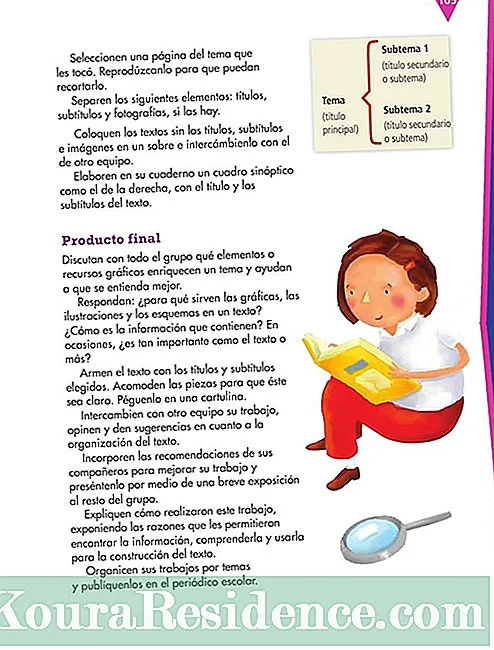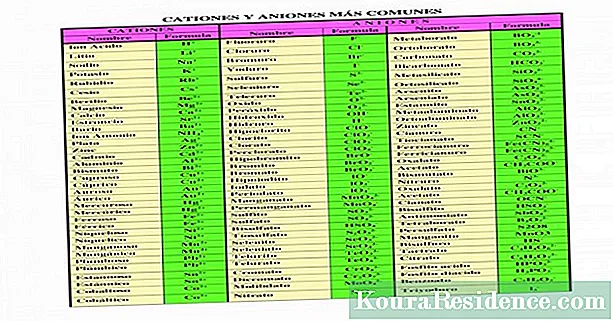
Content
el futur compost, També anomenat futur perfecte, en anglès s'utilitza per parlar d'accions que en el futur estaran finalitzades.
Quan es fa servir? Es pot utilitzar tant per a accions que ja van començar en el present com per a accions que començaran en el futur.
Per exemple:
- Acció que va començar en el present: I am preparing dinner. I will have finished by eight. / Estic preparant el sopar, hauré acabat per a les vuit.
- Acció que encara no va començar: He will start studying next year. By the time he 's twenty five he will have finished. / Començarà a estudiar l'any vinent. Per quan tingui vint anys ja està.
Estructura d'oracions positives
Subjecte + will + have (mai has) + verb en participi passat + complement
I will have finished this job by tomorrow. / Hauré acabat aquesta obra per a demà.
Estructura d'oracions negatives
Subjecte + will not / will not + have (mai has) + verb en participi passat + complement
I will not have finished this job by tomorrow. / No hauré acabat aquesta obra per a demà.
Estructura de les interrogacions
Will + subjecte + have (mai has) + verb en participi passat + complement +?
Will I have finished this job by tomorrow? / ¿Hauré acabat aquesta obra per a demà?
Exemples de futur compost en anglès
- I will have gone to the pharmacy by the time you arrive. / Hauré anat a la farmàcia per quan arribis.
- he will be graduated by the time he 's twenty five. / Estarà graduat per quan tingui vint anys.
- They will have left by tomorrow. / S'hauran anat per demà.
- The cake will have cooled by then. / El pastís s'haurà refredat per llavors.
- he will have solved the crime by the end of the episode. / Per al final de l'episodi ell haurà resolt el crim.
- Will you have finished the book by Monday? / ¿Hauràs acabat el llibre per al dilluns?
- he will have understood. / Ell haurà entès.
- In a few years he will have forgotten everything that happened today. / En uns anys s'haurà oblidat de tot el que va passar avui.
- By this time next year you will have visited every important monument in the city. / Per aquesta època de l'any que ve hauràs visitat cada monument important a la ciutat.
- With this rain I will have caught a cold by the time I get home. / Amb aquesta pluja tindré un refredat per quan arribi a casa.
- By the end of the date she will have Imagined their whole lives together. / Per al final de la cita ella hi haurà imaginat les seves vides junts.
- Come back on Monday and the place will have been cleaned. / Torneu dilluns i lloc haurà estat netejat.
- On June we will have lived in this house for three years. / Al juny haurem viscut en aquesta casa port de bestiar anys.
- The cold will have kept them fresh. / El fred els hi haurà conservat frescos.
- Menja over, we will have cooked something delicious. / Vine a visitar-nos, haurem preparat alguna cosa deliciós.
- By tomorrow we will have thought of a solution. / Per demà haurem pensat una solució.
- Will you have returned by the time I wake up? / ¿Hauràs tornat quan em desperti?
- My father will have taken care of it. / El meu pare s'haurà ocupat d'això.
- She will not have arrived before we leave. / Ella no haurà arribat abans que ens anem.
- They will have woken by noon. / S'hauran despertat per migdia.
- They will have looted the town. / Hi haurà saquejat el poble.
- I will have explained everything. / Hauré explicat tot.
- By Nighttime it will have stopped raining. / Per la nit hi haurà deixat de ploure.
- he will have planned everything. / Hi haurà planificat tot.
- They will have Ruined the surprised. / Hi haurà arruïnat la sorpresa.
- he will have thought of another excuse. / Hi haurà pensat en una altra excusa.
- They will have taken the opportunity. / Hi haurà aprofitat l'oportunitat.
- Next time you see him he will have Reconsidered his position. / La propera vegada que ho vegis haurà reconsiderat la seva posició.
- I will not have forgotten you. / No et hauré oblidat.
- It will have been stolen by then. / Hi haurà estat robat per llavors.
Pot servir-te: Exemples de Futur simple en anglès
El participi passat i els verbs irregulars
El participi passat en els verbs regulars es forma afegint la terminació -ed a el verb.
exemple:
- Work: worked.
- Washed: washed.
- Like: liked.
No obstant això, els verbs irregulars tenen altres formes de participi passat.
Verbs irregulars i la seva participi passat
- Arise, Arisen: sorgir.
- Awake, awoken: despertar-se.
- Be, been: ser / estar
- Become, become: convertir-se en
- Begin, begun: començar
- Blow, blown: bufar
- Bite, Bitten: mossegar
- Bleed, bled: sagnar
- Break, broken: trencar / trencar-se
- Bring, Brought: portar / dur amb si
- Buy, bought: comprar
- Can, no té participi passat: poder
- Menja, menja: venir.
- Do, done: fer
- Drive, driven: conduir
- Eat, eaten: menjar
- FORBID, forbidden: prohibir
- Forget, forgotten: oblidar
- Get, Gotten: aconseguir
- Give, given: donar
- Have / has, had, had: tenir / haver
- Hit, hit: colpejar
- Learn, learnt: aprendre
- Leave, left: abandonar / deixar / sortir
- Make, made: fer
- Run, run: córrer
- Say, said: dir
- See, seen: veure
- Sit, sat: seure
Andrea és professora d'idioma, i en el seu compte de instagram ofereix classes particulars per videotrucada perquè aprenguis a parlar anglès.


